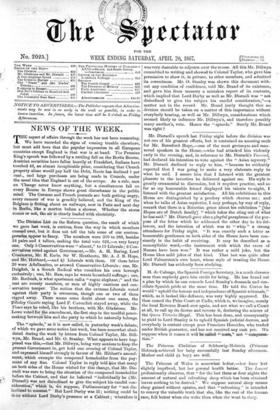The " episode," as it is now called, in yesterday
week's debate, of which we gave some notice last week, has been somewhat eluci- dated during the week by letters from Colonel Taylor, Mr. Dill- wyn, Mr. Brand, and Mr. 0, Stanley. What appears to have hap- pened was this,—that Mr. Dillwyn, being very anxious to keep the present Government in, got hold one evening of Colonel Taylor, and expressed himself strongly in favour of Mr. Hibbert's amend- ment, which exempts the compound householder from the pay- ment of any fine. Colonel Taylor in reply told him that many on both sides of the House wished for this change, that Mr. Dis- raeli was sure to bring the situation of the compound householder before the Cabinet, and that he believed " individually he (Mr. Disraeli) was not disinclined to give the subject his candid con- sideration;" which is, we suppose, Parliamentary for " not dis- inclined to consent." But Lord Derby was ill ; nothing could be done without Lord Derby's presence at a Cabinet ; wherefore it
was very desirable to adjourn over the recess. All this Mr. Dillwyn committed to writing and showed to Colonel Taylor, who gave him permission to show it, in private, to other members, and admitted its correctness. Mr. 0. Stanley was shown this document with- out any condition of confidence, told Mr. Brand of its existence, and gave him from memory a mistaken report of its contents, which implied that Lord Derby as well as Mr. Disraeli was " not disinclined to give the subject his candid consideration,"—a. matter not in the record. Mr. Brand justly thought that no. division 'should be taken on a matter of this importance without everybody hearing, as well as Mr. Dillwyn, considerations which seemed likely to influence Mr. Dillwyn's, and therefore possibly many another's, vote. Hence the " episode." Surely Mr. Brand was right?






























